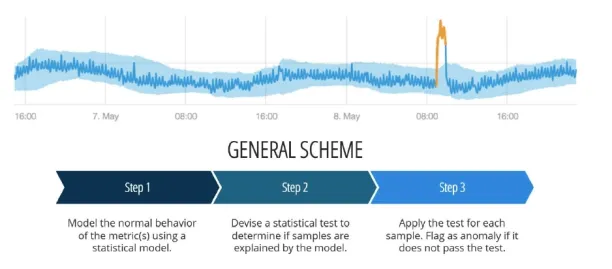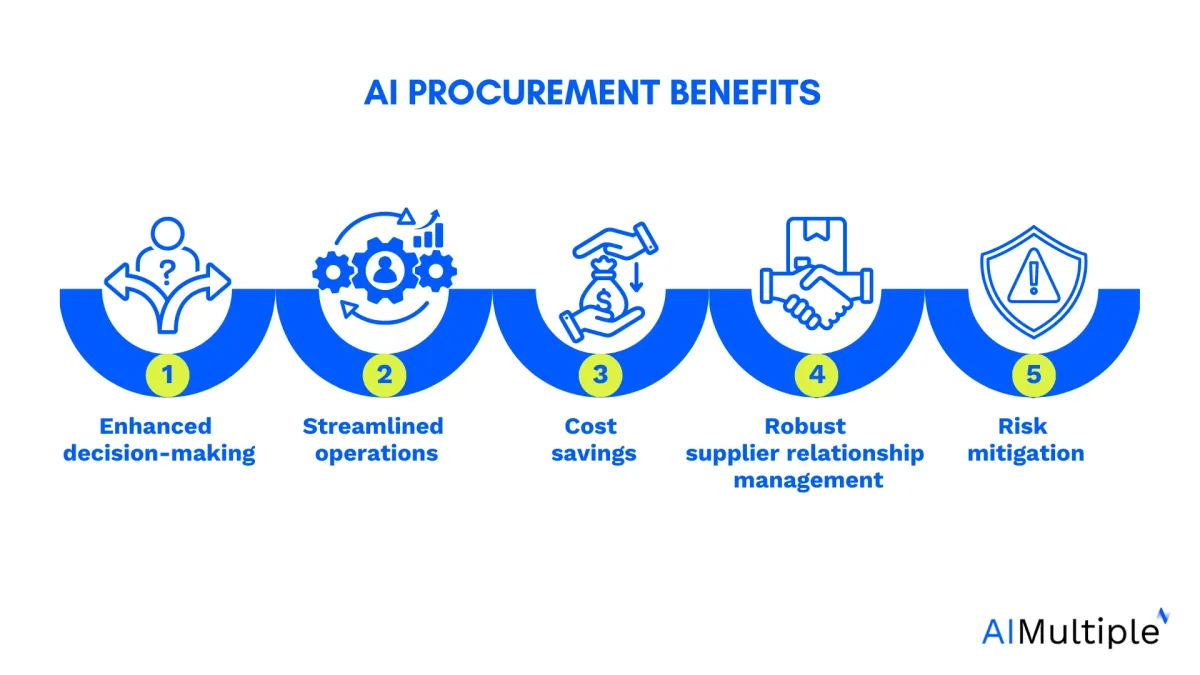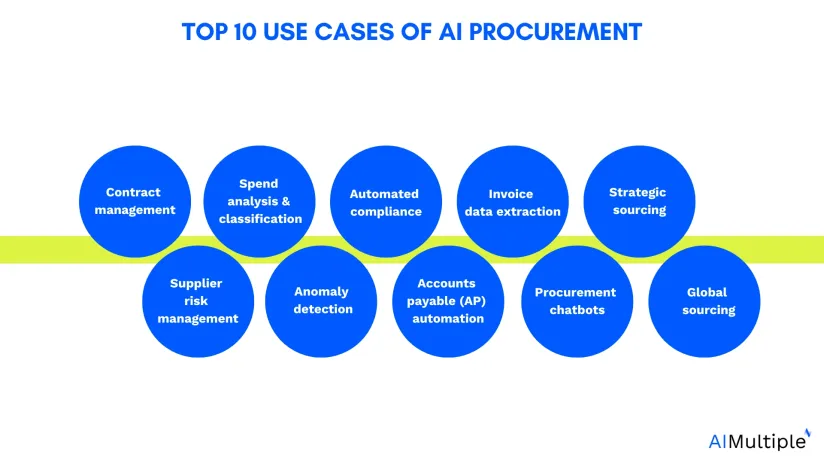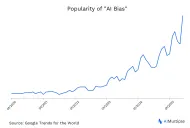As the benefits of artificial intelligence (AI) are appreciated by a greater audience, the number of AI use cases in different industries expand daily. AI in the procurement sector is no different.
See a comprehensive overview of the AI procurement process, detailing the reasons for its adoption, various use cases, specific case studies for each use case, the importance and benefits of AI procurement, and the technologies involved:
Why do procurement teams need to leverage AI?
Data is crucial for procurement teams because, without external or internal data, they cannot track spending on goods and services or manage supplier and vendor relationships effectively. The increasing volume of data allows procurement teams to manage cost savings and supplier/vendor performance risks more efficiently.
Data-driven decision-making is essential to ensure that the buyer acquires goods and services at the best possible price under the best conditions. Procurement involves a vast amount of structured and unstructured data (e.g., contracts, invoices, and other documents), which makes it difficult to analyze with traditional software.
Machine learning models and generative AI are built to process such existing data and derive insights. This makes procurement an ideal fit for AI because AI algorithms can provide insights and help companies make better decisions. According to Deloitte’s Survey, more than 60% of chief procurement officers indicated they are using advanced analytics.1
10 Use cases of AI in procurement processes
Artificial intelligence (AI) can transform procurement from a reactive to a proactive function that generates insights and improves operational efficiency. Common use cases include:
Supplier management
1. Contract management
Why it matters
Managing contracts effectively is crucial for managing risks, and optimizing supplier relationships. Traditional contract management processes can be slow and prone to errors.
AI solution
AI-powered contract management tools unify contract lifecycle management, and contract data extraction. Using NLP and machine learning, these tools analyze contract language, identify key terms, and manage contract lifecycle events. They automate the creation, review, and approval processes, reducing cycle times and improving compliance.
Benefits:
- Automated contract creation and review.
- Enhanced risk management.
- Streamlined contract lifecycle management, improving supplier relationships and operational efficiency.
Case study
A Fortune 200 pharmaceutical company leveraged an AI procurement software, to enhance its clinical trials journey by establishing an end-to-end platform for pre-clinical and clinical research. AI-enabled contract management streamlined vendor integration, expedited drug development, and improved patient monitoring.
This approach led to the creation of the Strategic Transactions Group, execution of multiple agreements, and development of processes that significantly reduced drug development time and optimized operational costs, ensuring efficient and effective clinical trials management.2
2. Supplier risk management
Why it matters
Managing supplier risk is critical for maintaining a stable and resilient supplier relationship management. Identifying potential supplier performance risks early can prevent disruptions and protect the organization.
AI solution
AI adopts big data methodologies to screen millions of existing data sources, providing alerts on potential risk positions across the supply chain processes. This proactive approach to risk management enhances the ability to respond to emerging threats.
Benefits:
- Proactive identification of supplier risks.
- Enhanced resilience and stability of the supply chain management.
- Improved ability to mitigate risks and maintain operational continuity.
Real-life example
A leading global fast-food chain faced significant supplier risk due to overdependence on two key suppliers for its sauces category, one of which was based in the U.K. This dependency raised concerns, especially with potential Brexit impacts on supply chains. To mitigate these risks, the company leveraged AI-powered software to assess and identify alternative suppliers.
This AI procurement software analyzed market demand and supplier capabilities, enabling the chain to reduce network distance by 25% and achieve savings of €3.2 million annually.
By optimizing the supply network and identifying domestic options in Europe, the fast-food giant decreased reliance on U.K. imports and enhanced supply chain resiliency, ensuring smoother and more cost-effective operations.3
Analytics
3. Spend analysis & classification
Why it matters
Accurate spend data is foundational for effective spend management strategies. Understanding internal spend is crucial for robust processes and compliance management.
AI solution
AI-powered spend classification algorithms dynamically search through line item details and flag keywords to tie to spend categories. By leveraging machine learning, these algorithms achieve approximately 97% accuracy, increasing precision and driving value in spend analytics.4
Benefits:
- Enhanced accuracy in spend classification.
- Improved spend analysis and category management.
- Identification of cost-saving opportunities through better spend visibility.
Real-life example
The existing procurement system of Pentair was outdated and complex, requiring extensive time to align spending data across business units. An AI procurement solution, implemented globally in just two months, transformed Pentair’s procurement process.
As a result, it provided over 90% accuracy in spend classification and facilitated significant improvements in supplier consolidation and payment terms. This resulted in a $15 million working capital improvement and empowered category managers to identify savings opportunities, driving strategic sourcing and spend management across the organization.5
4. Anomaly detection
Why it matters
Artificial intelligence enables businesses to automatically detect anomalies such as fraud, compliance issues, or price changes across the supplier landscape.
AI solution
AI can process vast amounts of data to provide real-time updates on anomalies and changes in the operating environment. This capability allows for instant notifications of significant developments with improved accuracy.

Source: Datanami6
Benefits:
- Automated detection of anomalies and irregularities.
- Enhanced risk management and mitigation.
- Real-time insights into operational changes.
Case study
AI has greatly benefited in anomaly detection, particularly in its accounts payable process. With a high volume of invoices from global partners, Scribd’s finance team faced manual input challenges and potential errors. By leveraging AI procurement automation capabilities, they streamlined purchase order matching, eliminated data entry errors, and accelerated financial processes by 60%.
This artificial intelligence in procurement not only saved them from hiring additional staff but also improved spend management and financial transparency significantly, allowing the team to focus on strategic tasks and customer service.7
5. Automated compliance
Why it matters
Compliance management is a critical but often manual and time-consuming task. Ensuring compliance with payment terms, contract clauses, and procurement policies is essential for risk management.
AI solution
AI can structure contract, invoice, and purchase order data to automatically identify and highlight non-compliance issues. By applying AI, procurement teams can compare payment terms, determine non-compliance, and identify duplicates automatically.
Benefits:
- Automated compliance checks.
- Reduced risk of non-compliance and associated penalties.
- Improved efficiency in managing compliance-related tasks.
Real-life example
MTN Group, a major telecommunications provider in Africa and the Middle East, faced challenges with slow and error-prone financial processes due to reliance on spreadsheets. To enhance accuracy and efficiency, MTN leverage AI for financial reporting and tax compliance.
This transition reduced head-office budget preparation time by 50%, provided executives with consistent and accurate data, and improved tax provisioning oversight across 23 countries. By standardizing processes and integrating AI, MTN significantly enhanced its compliance and operational agility.8
Automation of manual tasks
6. Accounts payable (AP) automation
Why it matters
The accounts payable process involves multiple manual stages, which can slow down invoice processing and approvals. Automation is key to improving efficiency and accuracy.
AI solution
AI and machine learning automate the AP process, reducing the number of human touches per invoice. This solution improves efficiency, reduces costs, and provides built-in compliance. For further information, read AI Applications in Accounts Payable (AP) Processes.
Benefits:
- Faster invoice processing and approvals.
- Reduced manual effort and associated errors.
- Improved compliance and cost savings in AP operations.
Case study
An AI procurement software significantly aids Landsec in automating its accounts payable (AP) processes, resulting in saved time, reduced manual workload, and improved productivity as AP automation case studies point. With AP automation, Landsec achieves up to 92% time savings on manual data capture and validation tasks.
The platform seamlessly connects Landsec’s workflow and proprietary app, ICE, with the AI engine and validation screen. It efficiently captures data from remittance advice and matches it with Landsec’s bank statement data, streamlining the AP automation process and enhancing overall operational efficiency.
7. Invoice data extraction
Why it matters
As a part of AP automation, manual invoice processing is time-consuming and prone to errors. Automating this process is essential for controlling workflow and verifying internal data capture efficiently.
AI solution
Generative AI solutions, including computer vision and natural language processing (NLP), automate the extraction of invoice data. This solution can be integrated into existing systems to streamline the invoice processing workflow.
Benefits:
- Automated invoice processing.
- Significant reduction in invoice processing time.
- Improved accuracy and efficiency in data capture.
- Enhanced control over the procure-to-pay process.
Case example
Artificial intelligence plays a crucial role in Jumio’s invoice data extraction process, enabling fast and accurate verifications while combating fraud and money laundering. By harnessing AI procurement software, Jumio automates purchase order and invoice processing, accelerates reconciliation times, and seamlessly integrates with ERP systems like NetSuite.
This automation not only saves time for the finance team but also improves accuracy and efficiency in managing procurement and accounts payable processes, allowing Jumio to focus on strategic initiatives and customer impact.9
8. Procurement chatbots
Why it matters
Procurement teams often spend significant time addressing routine queries from employees and suppliers, which can slow down operations.
AI solution
AI-powered procurement B2B chatbots provide support for procurement queries via text interface. These chatbots can handle inquiries about order status, shipment status, stock availability, stock prices, supplier status, and contact details. They can also alert procurement leaders for approvals of purchase orders and sales contracts, enabling instant action.
Benefits:
- Automated handling of routine procurement queries.
- Faster response times and improved user experience.
- Increased efficiency in procurement operations.
Real-life example
AI solutions play a pivotal role in Walmart’s procurement negotiations, particularly with tail-end suppliers. By leveraging an AI-powered chatbot, Walmart can conduct focused negotiations with a large number of suppliers, achieving agreements that are beneficial for both parties.
The chatbot automates the negotiation process, saving time and resources while improving the terms and flexibility within the supply chain. This innovative approach allows Walmart to efficiently manage negotiations, generate savings, and enhance the overall resilience of its procurement operations.10
9. Strategic Sourcing
Why it matters
Strategic sourcing involves managing and automating sourcing events to optimize AI procurement processes. Manual management of these events is inefficient and prone to errors.
AI solution
AI and machine learning are used to recognize bid sheets and develop specialized category-specific eSourcing bots for raw materials, maintenance, and repairs. These bots automate and streamline the sourcing process.
Benefits:
- Automated management of sourcing events.
- Improved efficiency and accuracy in strategic sourcing.
- Enhanced ability to leverage data for better sourcing decisions.
Case study
Kärcher faced challenges in non-production-related procurement due to time-consuming manual negotiation processes. To address this, Kärcher implemented autonomous operations solution, which brought significant efficiency enhancements.
This AI-powered platform automated the execution, negotiation, and award of tactical procurement processes, streamlined purchase requisition pre-selection, and reduced manual efforts.
As a result, Kärcher achieved substantial discounts and time savings, allowing procurement staff to focus on more value-added tasks. This AI-driven approach not only optimized process efficiency but also improved overall procurement quality. Following a successful pilot, Kärcher is now poised to scale this solution organization-wide, enhancing strategic sourcing and global insights.11
10. Global Sourcing
Why it matters
Global sourcing involves navigating a complex web of external data and supply chain dynamics. Effective sourcing strategies require insights into global supply trends and future market conditions.
AI solution
AI tools enable businesses to harness market data-driven insights for high-level sourcing strategies. AI can identify shifts in global supply trends, predict market prices, and inform sourcing strategies for various product categories.
Benefits:
- Data-driven product and supplier insights.
- Improved strategic sourcing decisions.
- Enhanced ability to respond to global supply chain disruptions.
Case study
A Fortune 500 oil and gas company faced inefficiencies and data siloes due to reliance on 15 legacy custom solutions for its procurement process. To address these challenges, the company implement a unified global system, consolidating the 15 solutions into two.
This AI-powered system improved procurement performance by providing real-time insights, increasing eSourcing adoption by 20%, and enhancing procurement ROI by 15%. The streamlined system also facilitated faster responses to market changes and better contract and spend management, significantly optimizing the company’s global sourcing strategy.12
The impact of generative AI on procurement
Generative AI is set to revolutionize procurement by transforming how decisions are made, processes are managed, and interactions are handled. The key ways generative AI will change AI procurement:
Real-time insights: Generative AI will provide real-time expert insights, enabling data-driven strategies for all spend categories and decisions. This shift ensures that procurement processes are more strategic and informed.
Personalization: Artificial intelligence will tailor every output and interaction to the specific needs of procurement professionals, suppliers, products, services, and commodities. This level of personalization will enhance satisfaction and efficiency in procurement activities.
Democratization of specialized procurement function: Tasks that previously required years of specialty experience will be accessible to novice users with AI guidance. This democratization will make specialized procurement work more widely accessible and manageable.
Work reduction: A significant portion of current source-to-pay (S2P) work will be automated or eliminated. Self-service and productivity improvements will drastically reduce the workload.
AI technologies used in procurement
Machine learning
Machine learning enables procurement teams to harness self-learning automated statistics, enhancing their ability to tackle challenges and optimize operational efficiency. Unlike robotic process automation (RPA), which is limited to automated tasks, ML algorithms can learn and adapt over time, delivering superior quality and bottom-line impact. Common applications in procurement include:
- Supervised learning is commonly used in spend analysis, aiding in spend classification and strategic decision-making.
- Unsupervised learning is useful for uncovering hidden insights in procurement data.
- Reinforcement learning allows algorithms to learn from actions and their consequences, potentially shaping future procurement strategies.
- Deep learning offers exciting opportunities for advanced data analysis.
Natural language processing (NLP)
NLP is another AI facet transforming procurement by enabling better understanding, interpretation, and manipulation of human language. Common applications in procurement include:
- Automated text parsing extracts data like termination dates, payment terms, and renegotiation rights from contracts and enhances contract management efficiency.
- AI-driven word embedding aids in analyzing textual data within purchase orders. By mapping words and phrases in relation to others, it streamlines categorization, facilitating better spend analysis and procurement decision-making.
- Natural language generation (NLG) powers chatbots and virtual assistants, interpreting human queries and generating responses, albeit currently limited in procurement to specific tasks.
Robotic process automation (RPA)
While not technically AI, RPA delivers substantial benefits in terms of process efficiency and productivity. RPA in procurement can be used in the following ways:
- Automated invoice processing: RPA systems streamline invoice processing by automating data extraction, validation, and reconciliation, minimizing errors and processing time.
- Purchase order generation: RPA automates the generation of purchase orders based on predefined rules and criteria, ensuring swift and accurate procurement processes.
- Automated task execution: RPA automates repetitive tasks such as data entry, document processing, and communication, freeing up time for strategic procurement initiatives.
5 Main benefits of AI procurement processes

1. Enhanced decision-making
AI-powered analytics empower procurement professionals with comprehensive insights derived from vast volumes of data. Machine learning algorithms identify patterns, trends, and anomalies in procurement data, enabling informed decision-making based on predictive and prescriptive analytics. This data-driven approach enhances strategic procurement planning, supplier selection, and risk management.
2. Streamlined operations
Automation through AI technologies such as robotic process automation (RPA) optimizes repetitive and time-consuming tasks in procurement. From invoice processing and purchase order generation to supplier onboarding and contract management, AI-driven automation streamlines operations, reduces manual errors, and enhances process efficiency. This allows procurement teams to focus on strategic initiatives and value-added activities.
3. Cost savings
AI-powered cost optimization tools analyze spending patterns, identify cost-saving opportunities, and negotiate favorable terms with suppliers. Predictive analytics forecast demand fluctuations, enabling proactive inventory management and reducing excess inventory costs.
Additionally, AI-driven contract management tools identify opportunities for cost containment and compliance adherence, leading to significant cost savings over time.
4. Robust supplier relationship management
AI technologies facilitate robust supplier relationship management (SRM) by providing real-time insights into supplier performance, risks, and opportunities. Supplier scoring algorithms evaluate supplier performance metrics, enabling proactive supplier engagement, contract renegotiation, and risk mitigation strategies.
AI-driven SRM tools foster collaborative relationships with suppliers, driving innovation, and continuous improvement.
5. Risk mitigation
AI-powered risk management tools monitor market trends, regulatory changes, and supply chain disruptions in real-time. Predictive analytics assess supplier risk profiles, identify potential disruptions, and recommend proactive mitigation strategies
Natural language processing (NLP) tools analyze contract terms, detect potential compliance issues, and ensure regulatory adherence, mitigating legal and operational risks effectively.
- 100+ AI Use Cases / Applications
- 12 AI Applications in Manufacturing
- 15 AI Applications/ Use Cases / Examples in Logistics
- 15+ AI Applications / Use Cases / Examples in Finance
You can also check out our list of AI tools and services:
FAQs
Why do procurement teams need to leverage AI?
Procurement teams need to leverage AI to stay competitive and improve their operational efficiency. AI can help procurement teams make better-informed decisions, reduce costs, and improve their market intelligence.
What is the procurement leaders’ role in AI implementation?
Chief procurement officers play a critical role in AI implementation in procurement functions, as they need to define the objectives and use cases for AI procurement adoption. Procurement experts need to collaborate with AI procurement providers and ensure that AI solutions are integrated with existing procurement systems.
What is procurement?
Procurement is the process of finding and agreeing to terms and acquiring goods, services, or works from an external source, often via a tendering or competitive bidding process. It involves making purchase decisions under conditions of scarcity. The aim of procurement expertise is to provide necessary products on time and with minimum procurement costs.
And if you still have questions regarding AI procurement, don’t hesitate to contact us:
External Links
- 1. 2023 Global Chief Procurement Officer Survey | Deloitte US. Deloitte
- 2. How GEP Helped A Pharma Giant Transform R & ED Procurement Infrastructure and Reduce Drug Development Time | GEP.
- 3. Global Fast-Food Chain Develops Supply Risk Mitigation Strategy With GEP | GEP.
- 4. The AI opportunity in sourcing and procurement. Deloitte. Accessed: 6/June/2024.
- 5. Pentair with Sievo. Sievo. Accessed: 7/June/2024.
- 6. Inside Anodot's Anomaly Detection System for Time-Series Data. Datanami
- 7. Scribd | Tipalti.
- 8. MTN Group cuts budget preparation time in half with Oracle Cloud.
- 9. Jumio | Tipalti.
- 10. How Walmart Automated Supplier Negotiations. Harvard Business Review
- 11. Augmented Procurement | Procure Ai.
- 12. How a Fortune 500 Oil & Gas Major Partnered With GEP To Achieve a 15% Jump in Procurement ROI | GEP.





Comments
Your email address will not be published. All fields are required.